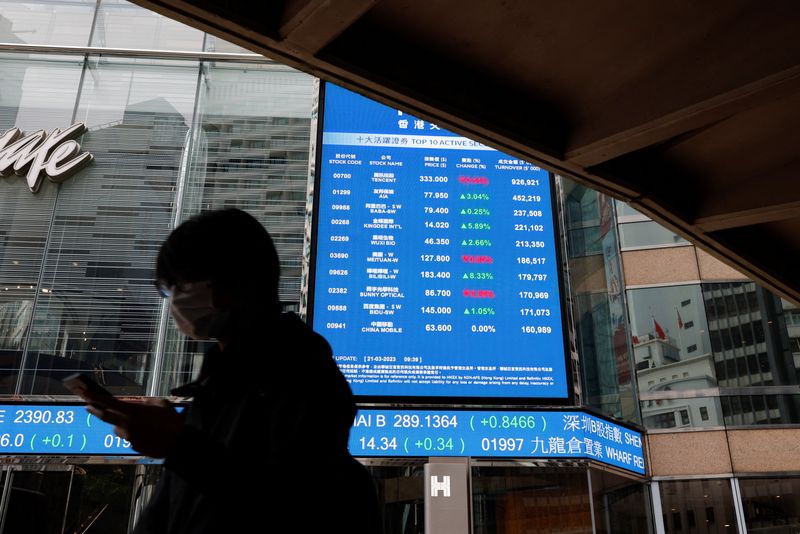Street Calls of the Week
By Koh Gui Qing
NEW YORK (Reuters) -U.S. stocks retreated from near two-week highs on Wednesday after the Federal Reserve raised borrowing costs, but signaled that it might be on the verge of pausing future interest rate hikes amid recent turmoil in financial markets.
As expected by many investors, the Fed raised interest rates by 25 basis points on Wednesday, but omitted from saying in its latest policy statement that "ongoing increase" in rates will likely be appropriate.
Markets interpreted the omission as a sign that rates might be peaking, and drove Treasury yields to session lows after the Fed's statement was released.
"Basically it's a dovish statement," said Peter Cardillo, chief market economist at Spartan Capital Securities. "They hinted that they're getting very close to the end of their tightening cycle."
The Dow Jones Industrial Average fell 0.3%, the gained 0.1%, and the Nasdaq Composite Index pulled back to stand flat.[.N]
The two-year yield, which rises with traders' expectations of higher Fed fund rates, pulled back to 3.9682% compared with Tuesday's close of 4.177%, and the yield on benchmark 10-year Treasury notes fell to 3.4847%, down from Tuesday's 3.606%. [US/]
In his press conference, Federal Reserve Chair Jerome Powell said that even though economic data showed stubborn inflation pressure, the turmoil in the banking market could result in credit tightening. But Powell noted that rate cuts are not in the Fed's base-case scenario.
Global markets were thrown into chaos in the past two weeks following the sudden failures of Silicon Valley Bank and Signature Bank, and an emergency sale of beleaguered Swiss lender Credit Suisse (SIX:CSGN).
Efforts by regulators and policymakers globally to counter banking sector turmoil have helped stem a rout in equity markets, though many investors fear other smaller lenders could be next in line to fail as credit markets tighten.
PERSISTENT INFLATION
The Fed's signal that it might pause its policy-tightening cycle comes as price pressures remain stubborn despite months of rate rises.
Data also showed British inflation unexpectedly rose to 10.4% in February, lifting expectations for a quarter point rate hike at Thursday's Bank of England meeting, boosting sterling.
European bonds have gone along for the ride. German two-year yields overnight recorded the biggest daily jump since 2008 as markets went back to pricing in more ECB hikes.
The euro meanwhile touched a near seven-week high at $1.0940, while sterling rose as much as 0.5% to $1.2274 after the British inflation data.
The dollar index fell on the Fed's dovish note, shedding 0.69%, and a softer dollar lifted the yen to 131.39. [USD/]
HOT SPOTS
Markets, unnerved by the banking sector turmoil, remained alert to signs of stress elsewhere.
The upheaval sparked by the collapse of Silicon Valley Bank is not yet over, and a significant number of banks will fail within two years, hedge fund Man Group CEO Luke Ellis said at a conference in London on Wednesday.
"I think we will have significantly more banks that don't exist in 12-24 months," Ellis said, adding that he thought smaller and regional banks in the United States and challenger banks in Britain could be at risk.
First Republic Bank was also in focus after efforts to secure a capital infusion continued without success on Tuesday. The stock was down 8.7%.
"The banking crisis is creating tighter credit conditions, and if you tighten conditions you weaken economic activity which puts more pressure on the banking sector," said Savary at Prime Partners. "I don't consider the banking crisis is over."
A softer dollar also buoyed oil prices. Brent crude rose $1.37, or 1.8%, to settle at $76.69 a barrel, while U.S. crude ended $1.23, or 1.8%, higher at $70.90. [O/R]
